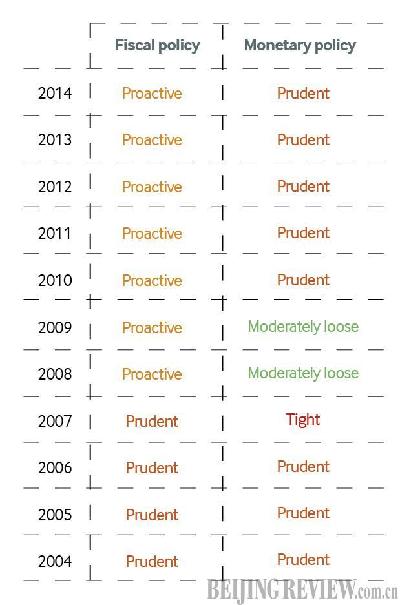

What does 'new normal' mean?
Consumption: Mass featureless consumption has come to an end and customized consumption is becoming mainstream.
Export and international balance: China still has competitive edge in exports; high-level imports and large-scale exports coexist.
Market competition: Quality-based differentiated competition has replaced quantity-based price competition.
Environment: Plans for green, low-carbon production and recycling will be adopted in the face of global climate change.
Investment: Infrastructure interconnection, new technology, new products and new business models have enabled massive investment opportunities.
Production: Smarter, smaller-scale professional production will gain more popularity.
Risk control: Economic risks are controllable in China, though it may take time to defuse risks caused by high leverage and asset bubbles.
Macro-regulation: The effects of massive stimulus measures are decreasing. China should digest the excess capacity while using market mechanism to explore industrial development in the future.
Production factors: Cheap labor force used to be China's biggest comparative advantage, but China's economic growth is currently more dependent on the quality of human resources and technological progress.
The Central Economic Work Conference
An annual meeting of China's top leadership where they map out the country's macroeconomic policies for the next year. It has been held at the end of each year since 1994 and lasts for two to four days. Participants of the conference include members of the Central Committee of the Communist Party of China and the State Council, provincial leaders, heads of financial regulators and executives from centrally administered state-owned enterprises.
Central Economic Work Conference Themes
Adapting to the "new normal" and keeping economic growth within a proper range
Seeking steady economic progress by making more reforms in all areas
Enhancing the quality of economic growth
Making progress while maintaining stability
Ensuring stable and relatively fast economic development while maintaining social stability
Promoting the transformation of economic development pattern while maintaining stable and comparatively fast economic growth
Maintaining stable and relatively fast economic growth
Shifting monetary policy from "prudent" to "tight"
Realizing sound and fast economic growth
Maintaining the continuity and stability of macroeconomic policy and improving the quality of economic growth
Improving macro-regulation, promoting reform and opening-up and pushing forward economic structural adjustment
Fiscal and Monetary Policies
A prudent fiscal policy means balanced fiscal revenue and fiscal spending.
A proactive fiscal policy means increasing fiscal spending to stimulate domestic consumption, to spur private investment and to expand exports.
A prudent monetary policy means adjusting the policy according to economic fluctuations. When there is any sign of economic recession, the monetary policy will be fine-tuned toward loose; when there is any sign of overheated economic development, the policy will be fine-tuned toward tight.
A moderately loose monetary policy means increasing money supply by printing money, buying bonds in open markets, cutting reserve requirement ratio for commercial banks and lowering loan rates.
A tight monetary policy means expanding the money supply more slowly than usual or even shrinking it.
Copyright ©1999-2018
Chinanews.com. All rights reserved.
Reproduction in whole or in part without permission is prohibited.